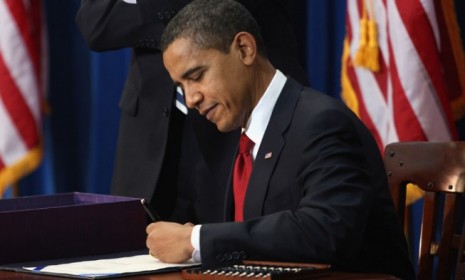The New Yorker's dissection of the 'Obama memos': 5 takeaways
Reporter Ryan Lizza is out with a "monster" 11,000-word investigation into hundreds of pages of secret White House memos. A look at the highlights

A free daily email with the biggest news stories of the day – and the best features from TheWeek.com
You are now subscribed
Your newsletter sign-up was successful
When Barack Obama entered the White House in 2009, he really believed that bipartisanship was viable in Washington, that he could overcome 40 years of increasingly bitter division between Republicans and Democrats, and that American politics is played "between the 40-yard lines," says Ryan Lizza in The New Yorker. Now, Lizza's review of hundreds of previously unreleased internal White House documents details Obama's rude awakening, and how he gave up his audacious hopes of transforming Washington in favor of getting things done as a "post-post-partisan" president. Here, five takeaways from Lizza's "monster" 11,000-word look at "the Obama memos":
1. The stimulus was too small — by design
Lizza's big score is a December 2008 memo from Larry Summers and Obama's other top economic advisers, says Ezra Klein at The Washington Post. The 57-page memo (which Lizza posted in full) "contains the economic team's first thoughts on almost everything the White House would go on to do," from the $787 billion stimulus package to health care reform. The memo acknowledged that the economy faced a $2 trillion hole, but suggested a stimulus no larger than $890 billion. That's because the government could only manage "about $225 billion of actual spending on priority investments" in the short term; less-stimulative components like tax cuts and aid to states offered diminishing returns; "an excessive recovery package could spook markets or the public and be counterproductive"; and Obama could ask Congress for more stimulus later if needed. They really got that last bit wrong, and grossly underestimated the depth of the financial crisis, says Derek Thompson at The Atlantic. But there's still "quite a lot that Summers and his team got right" in their "rich and complicated report."
The Week
Escape your echo chamber. Get the facts behind the news, plus analysis from multiple perspectives.

Sign up for The Week's Free Newsletters
From our morning news briefing to a weekly Good News Newsletter, get the best of The Week delivered directly to your inbox.
From our morning news briefing to a weekly Good News Newsletter, get the best of The Week delivered directly to your inbox.
2. Obama wanted a "moon shot" in the stimulus
After reading Summers' memo, Obama didn't push for a $1 trillion stimulus. But he still wanted something "bold and iconic" in the package, says Lizza: An "inspiring 'moon shot' initiative, such as building a national 'smart grid.'" Obama's economic team shot the idea down, arguing that large initiatives were too expensive and too long-term to jolt the economy. Instead, Obama requested $20 billion for high-speed trains. Two years later after Obama gave up on his "metaphorical moon-shot idea," he agreed to cut his predecessor's NASA Constellation project, designed to return astronauts to the moon, and America's "actual moon-shot program was dead, too."
3. He really, really wanted GOP support for health care reform
When Obama arrived in Washington, his idea of forming a centrist coalition didn't seem far-fetched — "after all, the pillars of his agenda seemed to enjoy bipartisan support," says Lizza. His health care reform plan, for example, "had been designed and employed by a Republican governor, Mitt Romney." The memos show Obama so gung-ho "to secure Republican cooperation and support" that he backed GOP-favored ideas like tort reform and scrapped good "initiatives like the public option, end-of-life counseling, and a host of other provisions that Republicans found repugnant," says Igor Volsky at ThinkProgress. He learned too late that Republicans would oppose any idea to keep Obama from scoring a big win.
A free daily email with the biggest news stories of the day – and the best features from TheWeek.com
4. The White House pivoted to austerity out of political consideration
By late 2009, after a year of Tea Party agitation and slipping polls, Obama's political team urged him to start talking up a "new era of responsibility." They advised that his upcoming State of the Union address was "an opportune moment to pivot to themes of restraining government spending." After the bank bailout, auto bailout, and stimulus, Obama's political team thought it "better to channel the anti-government winds than to fight them." So Obama froze non-defense federal spending and formed a presidential deficit-reduction commission, "learning the same lesson of many previous occupants of the Oval Office: He didn't have the power that one might think he had," says Lizza.
5. Obama is wary of the right-wing media
The president rejected at least one idea — paying federal employees to participate in a pilot program to study the most effective health care treatments — because it "could prove a target for Fox News," says ThinkProgress' Volsky. Obama liked the low-cost, high-reward idea, but was swayed by his political advisers, whose argument was summarized in a memo from Obama's secretary: The plan "is not politically viable," in part because "it could easily be caricatured by the right-wing press." In an almost apologetic memo to the plan's authors, Obama wrote, "Unfortunately I think the political guys are right about how it would be characterized. Let's go back at it in future years, when the temperature on health care and the economy has gone down."